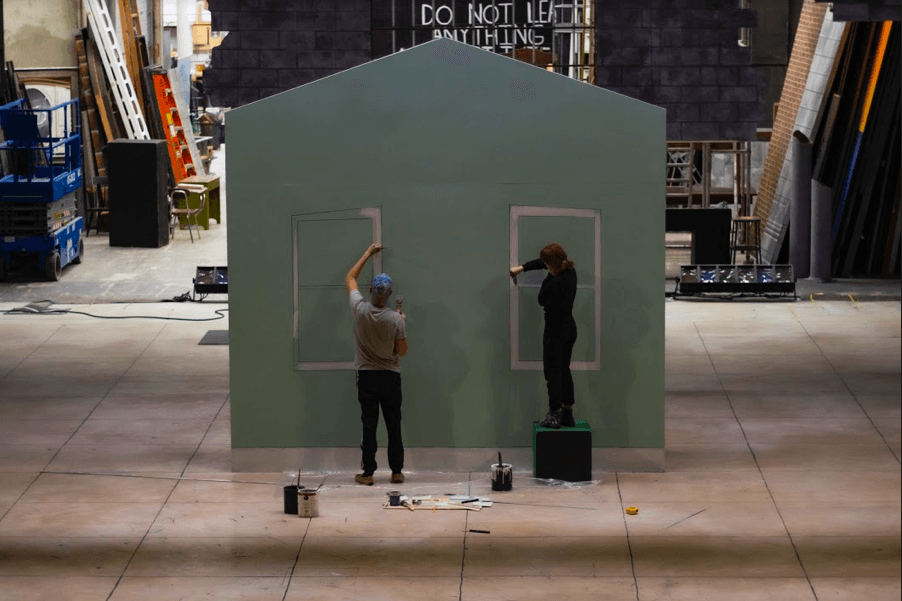Being a theater major takes many hours of hard work. Photo by Greg Clark.
Junior Emma Becker is taking 19 credits this semester and earning an additional five, adding up to a total of 24 credits earned in just one semester. But according to her, this is typical for herself and all of her peers pursuing a bachelor of fine arts.
Becker is a theatre major with concentrations in acting and directing, as well as a minor in education. She earns her five extra credits from participating in the theatre program’s productions. Last month, she earned partial credit as a dramaturg, a literary editor of a play, and is now earning the full three additional production lab credits as a puppeteer in “She Kills Monster,” which opens this Thursday. On top of all of this, she is also a teaching assistant for a sophomore acting class.
“It definitely becomes overwhelming,” Becker said of her schedule. “We know [that] coming into it and it kind of becomes a lifestyle choice at the end of the day.”
Students working towards earning a B.F.A. instead of a Bachelor of Arts at the University of Rhode Island still need the minimum 120 credits to graduate like every other student, but have a greater amount of major requirements within those 120 overall credits.
All theatre majors have to take 35 credits from the same courses, but concentrations have varying degrees of requirements. The acting concentration has the most requirements. Compared to students earning a B.A., acting concentrates in the theatre major must earn 77 credits out of 120 total in theatre credits, the most of any concentrates within the major, while journalism majors pursuing of B.A. must only complete a minimum of 31 credits within the major, with a maximum of 45.
Directing is the second most intensive concentrate within the department with a required 72 credits. Becker came to URI with a concentrate in acting, but decided to add directing as well at the end of her freshman year, which she found paired quite well with acting.
“Most of our students try to do two concentrations,” David T. Howard, chair of the theatre department said. “There are actually courses that overlap.”
Howard said that most students take 18 credits a semester and that adding a concentration often ends up adding just another 30 required credits at most. His goal with this advanced degree program is to create as close to a conservatory experience as possible.
Howard earned his B.F.A. in performance at the State University of New York at Fredonia and describes that program as very similar to the one here at URI as it gave him a well-rounded experience. While Howard has his degree in acting, he is a professor of costume design at URI.
“All of our students are exposed to every facet of theatre,” Howard said. “We want our students to have as much as a leg up on the field as possible. It was because I gathered skills that I was allowed to move into different aspects of the theatre that then allowed me to have a career.”
Beyond having to take classes that cover the different components of theatre, students of all concentrates also have to be involved in productions in different roles.
The productions put on at URI physically mirror a regional theatre according to Howard. Becker added that they mock union standards, specifically for actors, when it comes to their schedules, breaks and amount of time they spend working on a production in rehearsal.
“Everything is run in a very professional manner,” Becker said. “It is kind of like a side job. It’s like having field experience in a way. For us, working on a show is like real world practice.”
Becker mentioned that other’s perceptions of art majors can get frustrating. She has heard comments in which people say that there is no real world application for the degree she is pursuing and that art majors are just students who haven’t figured out what they want to do, comparing their classes to extracurriculars.
“We’re here and we’re working as much, if not harder than the other majors,” Becker said. “We get brushed aside a lot, which is upsetting because I think if people were behind the scenes, they’d see a lot more than they were expecting.”




